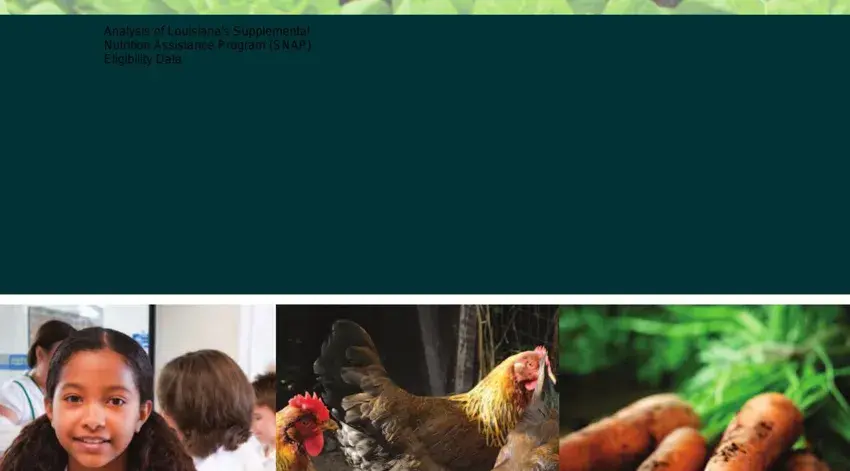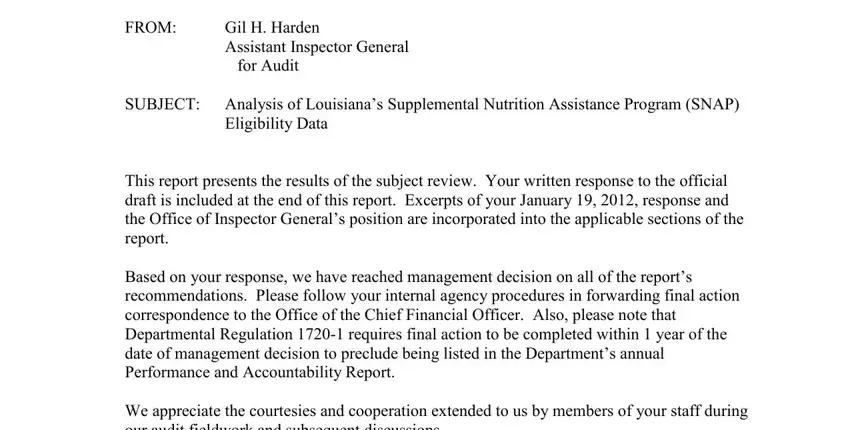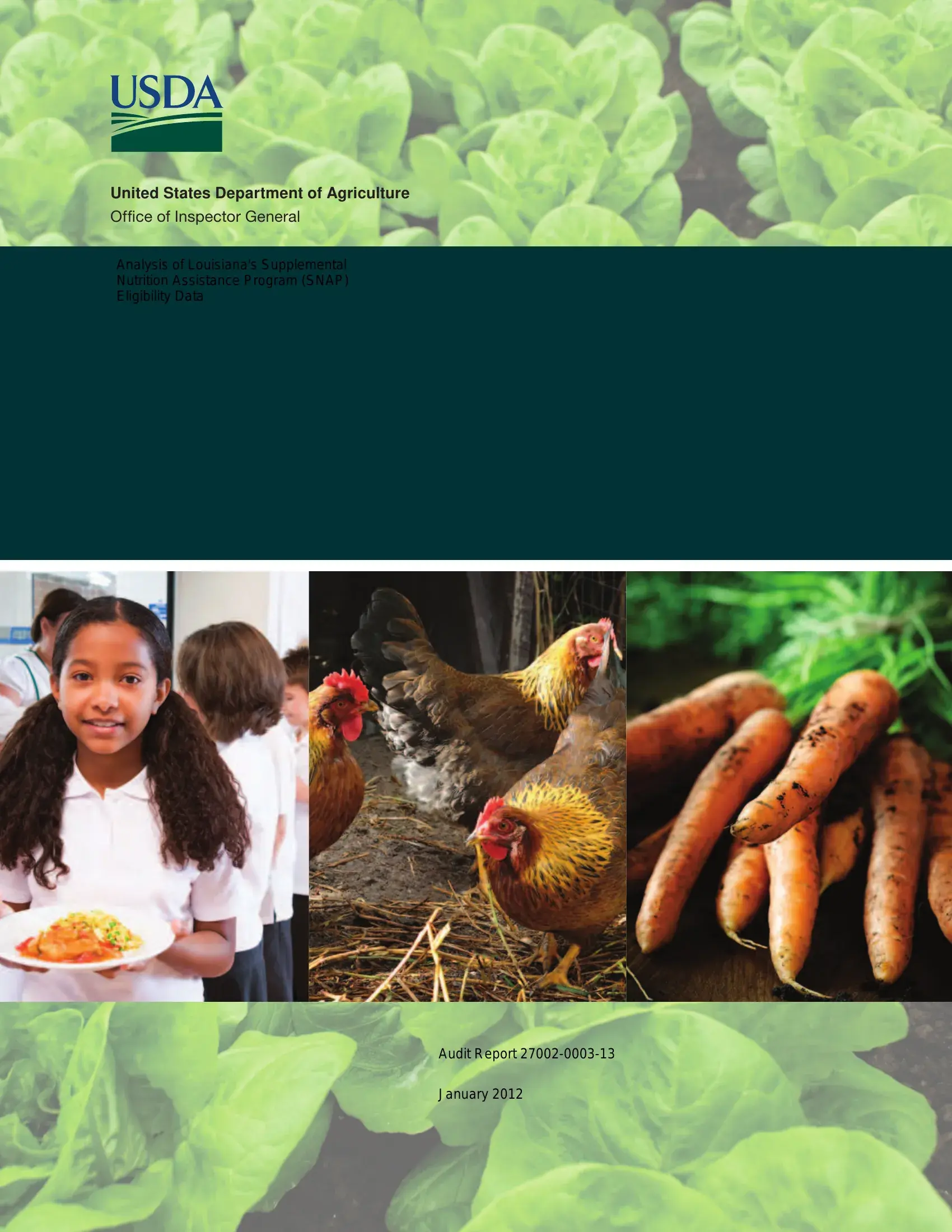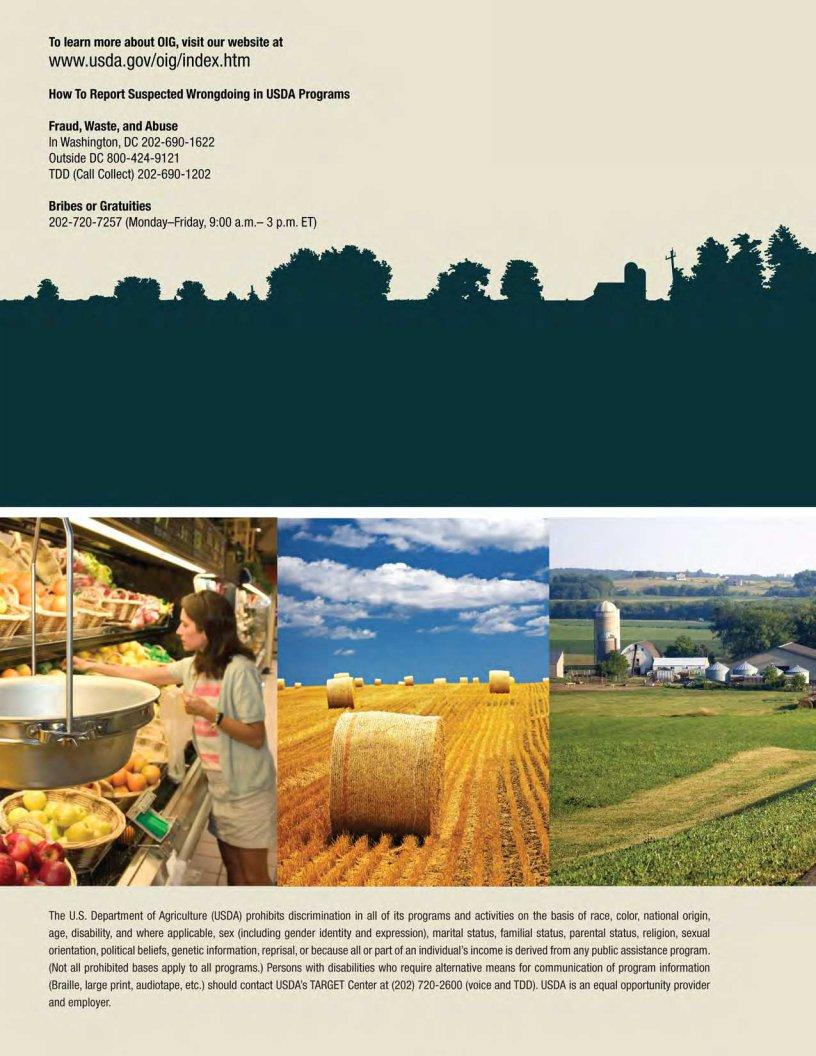United States Department of Agriculture
Office of Inspector General
United States Department of Agriculture
Office of Inspector General
Washington, D.C. 20250
DATE: |
January 31, 2012 |
AUDIT |
|
NUMBER: |
27002-0003-13 |
TO: |
Audrey Rowe |
|
Administrator |
|
Food and Nutrition Service |
ATTN: |
Mark Porter |
|
Acting Director |
|
Office of Internal Control |
|
Audits and Investigations |
FROM: |
Gil H. Harden |
|
Assistant Inspector General |
|
for Audit |
SUBJECT: |
Analysis of Louisiana’s Supplemental Nutrition Assistance Program (SNAP) |
|
Eligibility Data |
This report presents the results of the subject review. Your written response to the official draft is included at the end of this report. Excerpts of your January 19, 2012, response and the Office of Inspector General’s position are incorporated into the applicable sections of the report.
Based on your response, we have reached management decision on all of the report’s recommendations. Please follow your internal agency procedures in forwarding final action correspondence to the Office of the Chief Financial Officer. Also, please note that Departmental Regulation 1720-1 requires final action to be completed within 1 year of the date of management decision to preclude being listed in the Department’s annual Performance and Accountability Report.
We appreciate the courtesies and cooperation extended to us by members of your staff during our audit fieldwork and subsequent discussions.
.
Table of Contents |
|
Executive Summary |
1 |
Recommendation Summary |
2 |
Background and Objectives |
3 |
Background |
3 |
Objective |
4 |
Section 1: SNAP Eligibility Oversight Needs Strengthening |
5 |
Finding 1: FNS Should Strengthen its Oversight of DCFS’ Eligibility |
|
Review for SNAP |
5 |
Recommendation 1 |
7 |
Recommendation 2 |
8 |
Recommendation 3 |
8 |
Scope and Methodology |
9 |
Abbreviations |
10 |
Exhibit A: Summary of Monetary Results |
11 |
Agency’s Response |
13 |
Analysis of Louisiana’s Supplemental Nutrition Assistance Program (SNAP) Eligibility Data (27002-0003-13)
Executive Summary
The Food and Nutrition Service’s (FNS) Supplemental Nutrition Assistance Program (SNAP), formerly known as the Food Stamp Program, provides monthly food assistance and nutrition for the health and wellbeing of more than 40 million low-income individuals.1 The Office of Inspector General (OIG) initiated this audit in January 2011 to analyze the Louisiana SNAP participant database to identify anomalies that may result in ineligible participants receiving SNAP benefits.
Of the 825,918 average monthly recipients in Louisiana as of September 2010, we found
2,337 recipients (.3 percent) who were deceased, were using deceased individuals’ Social Security numbers (SSN), had invalid SSNs, were receiving duplicate benefits in Louisiana, exceeded income requirements, or were receiving benefits simultaneously with one of five nearby States.2 While Louisiana’s Department of Children and Family Services (DCFS) has taken several steps to safeguard against potential fraud, waste, and abuse, there is still some opportunity for improvement. DCFS, which administers SNAP, does not perform all checks necessary to ensure SNAP benefits go only to those who are eligible. Specifically, it does not check for deceased participants nor does it perform some edit checks that would help ensure that the participant information that is entered is accurate. Also, though DCFS uses the Public Assistance Reporting Information System (PARIS) database to check for duplicate enrollment across States, this system does not include all participants nationwide because FNS does not require States to participate in PARIS or to check for interstate participation.
In all, the 2,337 participants whose eligibility should have been researched cause us to question approximately $303,273 in benefits per month, based on the average monthly amount a recipient receives in Louisiana.3 With a 27 percent increase in participation since 2007, SNAP is a rapidly growing program in Louisiana. If DCFS does not take measures to increase preventative and fraud detection efforts, it risks making continued payments to individuals who are not eligible for SNAP benefits.
1For Fiscal Year 2010.
2Nearby States included Alabama, Florida, Mississippi, Missouri, and Texas.
3Potential improper payments are based upon the average amount a recipient receives in Louisiana each month ($129.77). We were not able to determine the actual amount because payments are calculated by household, not individual; therefore, even if one participant is ineligible—such as a deceased participant—it is possible that other members of the household are eligible to receive benefits at a lower amount. Additionally, because Louisiana’s participant start dates may not be accurate, it is uncertain how long these individuals had been receiving benefits, and therefore difficult to determine total payments made to that individual.
AUDIT REPORT 27002-0003-13 |
1 |

Recommendation Summary
FNS should provide guidance to ensure that DCFS is using a comprehensive, national Social Security Administration (SSA) database to perform its death matches and SSN verifications. FNS should also provide guidance for DCFS to utilize regular edit checks to verify the information in participant databases is accurate. In addition, FNS needs to require DCFS to review the 2,337 individuals identified in this report and determine if those participants have received improper payments, and recover as appropriate.
Agency Response
FNS concurs with our recommendations and is actively engaged in a dialogue with regional offices and with States regarding policies and technical assistance tools which can strengthen integrity to an even greater extent. FNS has final rules in process that will codify the requirement for the SSA death match with expected publication in early 2012. FNS also issued a policy memo on November 15, 2011, reminding States of the death and prisoner matching requirement. The State has committed to following up on the 2,337 individuals identified and estimates completion by September 30, 2012.
OIG Position
OIG concurs with FNS’ response that a policy be issued to codify the States’ requirement to use the SSA death match matching to identify participants improperly receiving SNAP benefits. OIG concurs with Louisiana’s response concerning follow-up on the 2,337 individuals identified in the report to determine if they received improper payments. We reached management decision on the report’s three recommendations.
2 AUDIT REPORT 27003-0003-13
Background and Objectives
Background
FNS’ SNAP program, formerly known as the Food Stamp Program, provides monthly food assistance and nutrition for the health and wellbeing of more than 40 million low-income individuals. Louisiana had 825,918 individuals—or 18 percent of the State’s population—enrolled in SNAP as of September 2010. Since 2007, the program has grown by 27 percent in Louisiana. While FNS pays the full cost of recipient benefits, both FNS and the States share the program’s administrative costs.
For enrollment and eligibility procedures, SNAP regulations at the Federal level specify minimum guidelines, such as maximum income requirements, to be enforced by the State agencies; however, these regulations did not establish a standardized system of internal control at the State level. FNS’ policy is to allow State agencies the flexibility to establish control systems that meet the individual needs of each State. For example, Federal regulations allow State agencies to determine whether or not they will interview recipients face-to-face or on the telephone prior to granting benefits. In Louisiana, DCFS performs telephone interviews for most applicants as opposed to face-to-face interviews. Each State agency owns and maintains its own eligibility system—including software and databases—which vary from State to State.
In Louisiana, applicants submit documents to prove citizenship, income, and expenses. To continue in the program, participants are required to verify their need for SNAP benefits during an interim review every 6 to 12 months, depending on the applicant’s status.4 Participants in SNAP apply and are approved or denied by DCFS based on pre-established eligibility requirements.
State agencies also have the primary responsibility for monitoring recipients’ compliance with program requirements and for detecting and investigating cases of alleged intentional program violation.5 Once applicants have submitted information, either during enrollment or the interim review process, DCFS performs several automated data checks to validate selected information submitted, including SSNs. State agencies are required to establish a system to ensure that certain prisoners do not receive benefits.6 State agencies must also check recipient data against a national
4Participants who are aged or disabled and receive Supplemental Security Income only need to verify their information every 12 months. All other participants must recertify every 6 months.
5An intentional program violation is defined as any act violating the Food Stamp Act, the Food Stamp Program regulations, or any State statute for the purpose of using, presenting, transferring, acquiring, receiving, possessing, or trafficking SNAP benefits. The definition includes any act that constitutes making a false or misleading statement or concealing or withholding facts.
6Public Law (PL) 105-33, Balanced Budget Act of 1997, Section 1003 (a) (1), dated August 5, 1997; and
PL 114-246, The Food and Nutrition Act of 2008, Section 11(r), dated October 1, 2008.
AUDIT REPORT 27002-0003-13 |
3 |
SSA database, which can be accessed using SSA’s State Verification Exchange System (SVES), 7 to ensure that deceased recipients do not receive benefits.8 In addition, DCFS utilizes additional national and State database systems to verify income and employment information provided by applicants.
Objective
OIG initiated this audit to analyze the Louisiana SNAP participant database to identify anomalies that may indicate in ineligible participants receiving SNAP benefits.
7Provided at no cost to State agencies, SVES matches against several national databases to check for death and SSN verification for every submitted individual. SSA’s Death Master File also checks SSNs nationwide to search for deceased individuals.
8PL 105-379, An Act to Amend the Food Stamp Act of 1997, Section 1(a), dated November 12, 1998.
4 AUDIT REPORT 27003-0003-13
Section 1: SNAP Eligibility Oversight Needs Strengthening
Finding 1: FNS Should Strengthen its Oversight of DCFS’ Eligibility Review for SNAP
We found that of the 825,918 average monthly recipients in Louisiana as of September 2010, 2,337 recipients (.3 percent) were deceased or were using deceased individuals’ SSNs, had invalid SSNs, were receiving duplicate benefits in Louisiana, exceeded income requirements, or were receiving benefits simultaneously with one of five nearby States. While DCFS has taken several steps to safeguard against potential fraud, waste, and abuse, there is some opportunity for improvement. Specifically, DCFS does not check for deceased participants nor does it perform some edit checks that would ensure the participant information is entered accurately. Additionally, though DCFS uses the PARIS database to check for duplicate enrollment across States, this system does not include all participants nationwide because FNS does not require States to participate in PARIS or States to check for interstate participation. Not performing these checks increases the risk of improper payments.
To verify that benefits are not issued to individuals who are deceased, DCFS, like all agencies who administer SNAP, is required to compare the information in the SNAP participant database with national SSA death information. When we used SSA’s Death Master File to perform this check ourselves, we found that 723 current Louisiana SNAP participants’ SSNs were listed in SSA’s Death Master File.9 Presently, Louisiana does not perform a continuous death match due to FNS’ policy on simplified reporting, which only requires reporting changes such as income, and does not require reporting of deaths until the recertification period when the participant reapplies for SNAP. 10 DCFS stated that they are performing this match upon application and at recertification. According to Public Law 105-379, States are required to perform a match to identify deceased individuals, and use the information to ensure that benefits are not issued to individuals who are deceased.11 The last time Louisiana conducted such a match was on April 21, 2010. Furthermore, DCFS does not have any current plan to check for deceased individuals in the future. Of the 723 deceased individuals we identified in our match, we found 146 individuals who were enrolled as a one-person household and benefits on the account were used after their date of death.12
We also found individuals using invalid SSNs. DCFS’ procedure is to verify an applicant’s SSN when initially applying for SNAP. State officials stated that in the past, case workers were instructed to assign temporary SSNs when an error was found or when a SSN needed to be updated into the system. Also, if participants cannot provide a valid SSN at the time of enrollment, the system automatically assigns a temporary SSN. If by the end of the first full
9The SSA Death Master File (DMF) is used by leading government, financial, investigative, credit reporting, and medical research organizations as well as other industries to verify individuals who have died.
107 CFR 273.12(a)(5) requires States to act on all changes reported by a household that would increase its benefits, and to act on changes that would decrease a household’s benefits in certain circumstances.
11PL 105-379, An Act to Amend the Food Stamp Act of 1997, Section 1(a), dated November 12, 1998.
12This test could only be performed on one-person households. When there are multiple people in a household, the system cannot distinguish which member of the household is using the benefits.
AUDIT REPORT 27002-0003-13 |
5 |
month of participation, participants still cannot produce a valid SSN or provide good cause for why they have not obtained a valid SSN they should be removed from the program.13 However, we found that 27 participants had SSNs that did not match the format of the SSA scheme for valid SSNs and 18,664 participants were enrolled in the program with a temporary SSN. Of the 18,664 individuals, 10,137 of these had been enrolled in the program for over a year. This occurred because DCFS does not currently check for input errors caused when personnel enter the SSN into the system, or for invalid SSN schemes such as those starting with “666” that have been present for more than the first month of participation. DCFS is working to correct these invalid SSNs as soon as possible, and stated that temporary SSNs would remain associated with the participant until a valid SSN is obtained.
We also found 14 individuals receiving SNAP benefits simultaneously under two separate accounts. DCFS currently has an edit check to prevent entering the same SSN in the system; however, it was unable to locate these duplicate individuals until we performed a query matching the applicant’s name and birth date with a different address. When we notified the agency of the duplicate individuals, the agency investigated them, and determined if dual benefits were received. DCFS has since taken measures to recover overpaid benefits. Because this type of error is rare and does not pose a great risk, we are not making a recommendation at this time.
DCFS also had multiple instances of interstate enrollment with the States of Alabama, Florida, Mississippi, Missouri, and Texas. Each participant should only receive SNAP benefits from the State where the participant resides. To safeguard against interstate enrollment and potential fraud, Louisiana’s SNAP application form asks applicants if they are receiving, or have received, benefits from another State. We matched SNAP enrollment data between Louisiana and these nearby States and found that despite these precautions, 1,573 individuals enrolled in the Louisiana SNAP program were simultaneously enrolled in one of the nearby States for
3 consecutive months. In some cases, participation in multiple States occurred because FNS does not have a nationwide database of all SNAP participants for DCFS to check. While DCFS does utilize PARIS—an optional, multi-State database that stores social welfare program participant information—not all States input their SNAP participant information in PARIS. As a result, PARIS’ information is incomplete. With mandatory SNAP participation in PARIS or a similar system, DCFS—as well as other State agencies—would have access to a reliable, nationwide database, which they could then utilize in their fraud detection efforts. In other cases, participation in multiple States occurred because DCFS case workers only check the system’s PARIS Interstate Match at application, interim review, and recertification. Since PARIS results are reported in the second month of each quarter for the previous calendar quarter, Louisiana believes the data within PARIS are outdated. Although the data in PARIS may be delayed, until a more sophisticated system is developed by FNS, we recommend the database should still be used to determine interstate participants as applicable.
We also found 893 households with a participant with an age of 60 or older that exceeded the net income limitations of the SNAP program. According to 7 CFR 273.9(a), FNS has maximum net income levels that each household with a member who is age 60 or older or is disabled, must be
13Office of Family Support (OFS) Chapter 4 – Family Assistance Manual: Eligibility Factors (SNAP),
Section B-400 SNAP Enumeration/Social Security Numbers (SNAP), Document B-440-SNAP Reporting SSNs, dated
April 1, 2011.
6 AUDIT REPORT 27003-0003-13
under to be eligible for SNAP. After reviewing several of the 893 households, DCFS officials stated that these cases received benefits under the Louisiana Combined Application Project (LaCAP), which allows otherwise ineligible participants to continue in the SNAP program, although they exceed income limits.14
We also noted that 3,708 individuals receiving benefits from Louisiana reported themselves to be non-US citizens. While non-US citizens are eligible for SNAP, it is another area that States need to monitor. We also found instances where a participant’s start date was before their date of birth. DCFS is aware of this issue and is in the process of developing a new system that includes an edit check to ensure the client’s start date occurs after their date of birth. We accept these measures and encourage DCFS to perform regular edit checks for input errors.
In all, the 2,337 participants whose eligibility should have been researched cause us to question approximately $303,273 in benefits per month, based on the average benefit amount a recipient receives in Louisiana. We have forwarded these participants to DCFS for further research and investigation. Taken within the context of SNAP as a whole, our findings do not represent large monetary sums, but they do show areas where FNS and DCFS could make progress in reducing potential improper payments. We acknowledge that DCFS is in the process of researching and resolving several of these issues and believe that by checking for deceased participants and utilizing input edit checks, DCFS can further improve its fraud detection and prevention. In addition, if FNS mandates that all States participate in PARIS or a similar national database, States would have a powerful resource to use in checking for—and ultimately reducing— interstate duplicate enrollment nationwide.
Recommendation 1
Provide guidance for DCFS to use a comprehensive, national SSA database to perform its death matches and SSN verifications.
Agency Response
FNS has final rules in process that will codify the existing requirement that States perform the SSA death match. This rule is expected to be published in early 2012. FNS also issued a policy memo reminding States of this requirement, which went out to States on November 15, 2011. Estimated completion date is January 31, 2012.
OIG Position
OIG concurs with FNS’ response that a policy be issued to codify the existing States’ requirement to perform the SSA death match. We reached management decision on this recommendation.
14LaCAP is a food assistance program for Louisiana residents who are at least 60 years of age and receive Supplemental Security Income. It is a simplified version of SNAP.
AUDIT REPORT 27002-0003-13 |
7 |

Recommendation 2
Ensure that DCFS regularly performs the checks noted above on the eligibility data to determine whether information in participant databases is accurate and complete.
Agency Response
FNS already has a number of activities in place that will address the situations found in this report. FNS is currently in the process of awarding a grant through the OMB Partnership fund for Program Integrity. This grant will fund development of a pilot clearinghouse database with information from five States in the Southeast and Southwest for detecting duplicate participation in SNAP and Disaster Supplemental Nutrition Assistance Program (D-SNAP) across State boundaries. FNS supports Louisiana’s participation in this partnership fund pilot project that will explore options for better interstate duplicate participation monitoring. Estimated completion date is January 31, 2012.
OIG Position
OIG concurs with FNS’ response in developing a clearinghouse database with information for detecting duplicate participation in SNAP and D-SNAP across State boundaries. We reached management decision on this recommendation.
Recommendation 3
Require DCFS to review the 2,337 individuals identified in this report and determine if participants have received improper payments. Recover improper payments as appropriate.
Agency Response
FNS agrees with this recommendation and estimates completion by September 30, 2012.
OIG Position
OIG concurs with Louisiana’s response concerning follow-up on the 2,337 individuals identified in the report and will determine if they received improper payments. We reached management decision on this recommendation.
8 AUDIT REPORT 27003-0003-13

We analyzed the participants in the Louisiana SNAP program for the timeframe of March 2010 through March 2011. Louisiana was selected because it is one of the largest States in terms of SNAP participation. We selected the timeframe of March 2010 through March 2011, because, at the time of our audit, it was the latest information available.
We obtained SSA’s Death Master File and extracts of key SNAP participant data from Louisiana State officials. We also obtained SNAP participant data from the five nearby States of Alabama, Florida, Mississippi, Missouri, and Texas. We analyzed this data using Audit Command Language. Our tests were developed to identify anomalies that may result in ineligible participants receiving SNAP benefits and to determine whether FNS provided adequate program guidance and oversight. Our tests determined whether
·Active SNAP participants were using deceased individuals’ SSNs,
·Invalid SSNs were used,
·Duplicate payments were received,
·Recipients were receiving benefits simultaneously from nearby States, and
·Active participants were disqualified from receiving SNAP benefits.
As applicable, the anomalies identified were verified by Louisiana State officials.
We reviewed public laws and FNS regulations, policies, procedures, and other controls governing the administration of SNAP to ensure DCFS complied with Federal guidelines. We examined Louisiana’s SNAP policies, procedures, and internal controls to ensure DCFS complied with FNS guidelines. We evaluated reports that resulted from reviews relative to SNAP, the Federal Manager’s Financial Integrity Report for fiscal year 2011, and Government Accountability Office reports. We interviewed Louisiana State officials and obtained supporting documentation.
We conducted our audit work with DCFS in Baton Rouge, Louisiana, and FNS’ National Office in Alexandria, Virginia. We also met with FNS’ Southwest Regional Office in Dallas, Texas. Our audit period was January 2011 through January 2012.
We conducted this review in accordance with generally accepted government auditing standards. Those standards require that we plan and perform the audit to obtain sufficient, appropriate evidence to provide a reasonable basis for our findings and conclusions based on our audit objectives. We believe that the evidence obtained provides a reasonable basis for our findings and conclusions based on our audit objectives.
AUDIT REPORT 27002-0003-13 |
9 |
DCFS |
Department of Children and Family Services |
DMF |
Death Master File |
D-SNAP |
Disaster Supplemental Nutrition Assistance Program |
FNS |
Food and Nutrition Service |
FY |
Fiscal Year |
LaCAP |
Louisiana Combined Application Project |
OFS |
Office of Family Support |
OIG |
Office of Inspector General |
OMB |
Office of Management and Budget |
PARIS |
Public Assistance Reporting Information System |
PL |
Public Law |
SNAP |
Supplemental Nutrition Assistance Program |
SSA |
Social Security Administration |
SSN |
Social Security Number |
SVES |
State Verification Exchange System |
USDA |
Department of Agriculture |
10 AUDIT REPORT 27003-0003-13
Exhibit A: Summary of Monetary Results
|
FINDING |
RECOMMENDATION |
DESCRIPTION |
AMOUNT |
CATEGORY |
|
NUMBER |
NUMBER |
|
|
|
|
|
|
|
|
|
|
|
|
|
723 Clients |
$93,824 |
|
|
|
|
identified on the |
Questioned Cost, |
|
1 |
3 |
average per |
|
Death Master |
Recovery Recommended |
|
|
|
month |
|
|
|
File |
|
|
|
|
|
|
|
|
|
|
|
|
|
|
|
1,573 Clients |
$204,128 |
|
|
|
|
participating in |
Questioned Cost, |
|
1 |
3 |
SNAP in LA and |
average per |
|
Recovery Recommended |
|
|
|
either AL, FL, |
month |
|
|
|
|
MS, MO or TX |
|
|
|
|
|
|
|
|
|
|
|
14 Clients |
$1,817 |
|
|
|
|
receiving |
Questioned Cost, |
|
1 |
3 |
average per |
|
duplicate |
Recovery Recommended |
|
|
|
benefits in LA |
month |
|
|
|
|
|
|
|
|
|
|
|
$3,504 |
Questioned Cost, |
|
1 |
3 |
27 Invalid SSNs |
average per |
|
Recovery Recommended |
|
|
|
|
month |
|
|
|
|
|
|
|
|
|
|
|
|
TOTAL |
|
|
$303,273 average per month |
|
|
|
|
|
|
The table above represents the $303,273 in average questioned costs per month, recovery recommended.
AUDIT REPORT 27002-0003-13 |
11 |
12 AUDIT REPORT 27003-0003-13
USDA’S
FOOD AND NUTRITION SERVICE’S
RESPONSE TO AUDIT REPORT
AUDIT REPORT 27002-0003-13 |
13 |

United States
Department of
Agriculture
FOOD AND
NUTRITION
SERVICE
3101 PARK CENTER DRIVE ROOM 712
ALEXANDRIA, VA 22302-1500
DATE: |
January 19, 2012 |
AUDIT |
|
NUMBER: |
27002-03-13 |
TO: |
Gil H. Harden |
|
Assistant Inspector General for Audit |
FROM: |
/s/ <Jeffrey Tribiano> (for): Audrey Rowe |
|
Administrator |
|
Food and Nutrition Service |
SUBJECT: |
Analysis of Louisiana’s Supplemental Nutrition Assistance Program |
|
(SNAP) Eligibility Data |
This letter responds to the official draft report for audit report number 27002-03-13, Analysis of Louisiana’s Supplemental Nutrition Assistance Program (SNAP) Eligibility Data. Specifically, the Food and Nutrition Service (FNS) is responding to the three recommendations in the report.
OIG Recommendation 1:
Provide guidance for Louisiana Department of Children and Family Services (DCFS) to use a comprehensive, national SSA database to perform its death matches and SSN verifications.
Food and Nutrition Service Response:
FNS has final rules in process that will codify the existing requirement that States perform the SSA death match. This rule is expected to be published in early 2012. FNS also issued a policy memo reminding States of this requirement, which went out to States on November 15, 2011.
According to the Louisiana State agency’s comments on the audit, the report is incorrect, stating that DCFS does run the death match and results are returned via the clearance summary at application, during the simplified reporting month and at redetermination. It further states that DCFS no longer runs a quarterly death match and the report inaccurately states that April 21, 2010, is the last time the match was run. DCFS reports that although they stopped producing the death match report quarterly for field staff to clear, the information is returned in the clearance summary.
Estimated Completion Date: January 31, 2012
P a g e | 2
OIG Recommendation 2:
Ensure that DCFS regularly performs the checks noted above on the eligibility data to determine whether information in participant databases is accurate and complete.
Food and Nutrition Service Response:
FNS takes program integrity very seriously. Any errors are of concern; however, FNS notes that the findings in this report constitute less than 0.3 percent of the Louisiana caseload suggesting that while current processes can always be improved, they are, in fact, working. Pursuant to the critical importance of integrity to ensure that people in need receive nutrition assistance to which they are entitled, FNS is actively engaged in a dialogue with our regional offices and with States regarding policies and technical assistance tools which can strengthen integrity to an even greater extent.
FNS already has a number of activities in place that will address the situations found in this report. FNS is currently in the process of awarding a grant through the Office of Management and Budget (OMB) Partnership Fund for Program Integrity. This grant will fund development of a pilot clearinghouse database with information from five States in the Southeast and Southwest for detecting duplicate participation in SNAP and disaster SNAP (D-SNAP) across State boundaries. FNS supports Louisiana’s participation in this partnership fund pilot project that will explore options for better interstate duplicate participation monitoring. Additionally, audit States Alabama, Mississippi, and Florida are also part of the coalition of States that will use grant funds from the OMB Partnership Project to develop the interstate clearinghouse.
Per SNAP regulations at 7 CFR 272.4(e)(1), each State agency shall establish a system to assure that no individual participates more than once in a month, in more than one jurisdiction, or in more than one household within the State. FNS further encourages States to have processes in place to check data with neighboring States to prevent duplicate participation across State lines. The Public Assistance Reporting Information System (PARIS) is available to States as an additional tool to identify interstate duplicate participation but it is not mandatory for States to use PARIS. Some States have expressed concerns that the information in PARIS is not timely.
Expected Completion Date: January 31, 2012
OIG Recommendation 3:
Require DCFS to review the 2,337 individuals identified in this report and determine if participants have received improper payments. Recover improper payments as appropriate.
AN EQUAL OPPORTUNITY EMPLOYER
P a g e | 3
Food and Nutrition Service Response:
FNS agrees with this recommendation. FNS would like to reiterate that a household is categorically eligible for SNAP if it receives Supplemental Security Income (SSI), general assistance (GA), Temporary Assistance for Needy Families (TANF) assistance or non-cash benefits or services. Categorically eligible households must meet the income and asset limits from the TANF, GA, or SSI program to be eligible for SNAP. While categorical eligibility makes a household eligible for SNAP, the household must still meet all other SNAP eligibility requirements and have a net income that qualifies it for a benefit.
FNS notes that many non-citizens are eligible for SNAP. FNS asserts that the report reference to non-citizens is confusing and misleading. The fact that 3,708 individuals receiving benefits in Louisiana reported themselves to be non US citizens is neither an area of concern nor anomaly.
Estimated Completion Date: September 30, 2012
AN EQUAL OPPORTUNITY EMPLOYER
Informational copies of this report have been distributed to:
Government Accountability Office (1)
Office of Management and Budget (1)
Office of the Chief Financial Officer (1) Director, Planning and Accountability Division
To learn more about OIG, visit our website at
www.usda.gov/oig/index.htm
How To Report Suspected Wrongdoing in USDA Programs Fraud, Waste, and Abuse
In Washington, DC 202-690-1622
Outside DC 800-424-9121
TDD (Call Collect) 202-690-1202
Bribes or Gratuities
202-720-7257 (Monday-Friday, 9:00a.m.- 3 p.m. ED
The U.S. Department of Agriculture (USDA) prohibits discrimination in all of its programs and activities on the basis of race, color, national origin, age, disability, and where applicable, sex (including gender identity and expression), marital status, familial status, parental status, religion, sexual orientation, political beliefs, genetic information, reprisal , or because all or part of an individual's income is derived from any public assistance program. (Not all prohibited bases apply to all programs.) Persons with disabilities who require alternative means for communication of program information (Braille, large print, audiotape, etc.) should contact USDA's TARGET Center at (202) 720-2600 (voice and TDD) . USDA is an equal opportunity provider and employer.























